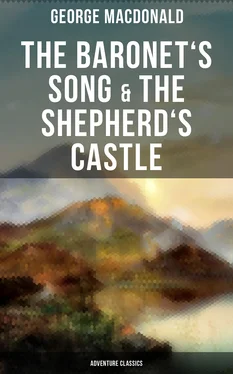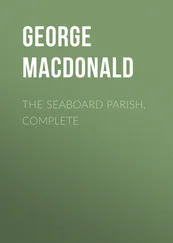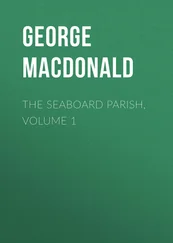"O Lord, gin ye wad but say what ye wad hae deen! Whan a body disna ken yer wull, she's jist driven to distraction. Thoo knows, my Maister, as weel's I can tell ye, 'at gien ye said till me, 'That man's gauin' to cut yer thro't: tak the tows frae him, an' lat him up,' I wad rin to dee't. It's no revenge, Lord; it's jist 'at I dinna ken. The man's dune me no ill, 'cep' as he's sair hurtit yer bonnie Gibbie. It's Gibbie 'at has to forgie 'im an' syne me. But my man tellt me no to lat him up, an' hoo am I to be a wife sic as ye wad hae, O Lord, gien I dinna dee as my man tellt me! It wad ill befit me to lat my auld Robert gang sae far wantin' his denner, a' for naething. What wad he think whan he cam hame! Of coorse, Lord, gien ye tellt me, that wad mak a' the differ, for ye're Robert's maister as weel's mine, an' your wull wad saitisfee him jist as weel's me. I wad fain lat him gang, puir chiel! but I daurna. Lord, convert him to the trowth. Lord, lat him ken what hate is.—But eh, Lord! I wuss ye wad tell me what to du. Thy wull's the beginnin' an' mids an' en' o' a' thing to me. I'm wullin' eneuch to lat him gang, but he's Robert's pris'ner an' Gibbie's enemy; he's no my pris'ner an' no my enemy, an' I dinna think I hae the richt. An' wha kens but he micht gang shottin' mair fowk yet, 'cause I loot him gang!—But he canna shot a hare wantin' thy wull, O Jesus, the Saviour o' man an' beast; an' ill wad I like to hae a han' i' the hangin' o' 'm. He may deserve 't, Lord, I dinna ken; but I'm thinkin' ye made him no sae weel tempered—as my Robert, for enstance."
Here her voice ceased, and she fell a moaning.
Her trouble was echoed in dim pain from Gibbie's soul. That the prophetess who knew everything, the priestess who was at home in the very treasure-house of the great king, should be thus abandoned to dire perplexity, was a dreadful, a bewildering fact. But now first he understood the real state of the affair in the purport of the old man's absence; also how he was himself potently concerned in the business: if the offence had been committed against Gibbie, then with Gibbie lay the power, therefore the duty of forgiveness. But verily Gibbie's merit and his grace were in inverse ratio. Few things were easier to him than to love his enemies, and his merit in obeying the commandment was small indeed. No enemy had as yet done him, in his immediate person, the wrong he could even imagine it hard to forgive. No sooner had Janet ceased than he was on his way back to the cottage: on its floor lay one who had to be waited upon with forgiveness.
Wearied with futile struggles, Angus found himself compelled to abide his fate, and was lying quite still when Gibbie re-entered. The boy thought he was asleep, but on the contrary he was watching his every motion, full of dread. Gibbie went hopping upon one foot to the hole in the wall where Janet kept the only knife she had. It was not there. He glanced round, but could not see it. There was no time to lose. Robert's returning steps might be heard any moment, and poor Angus might be hanged—only for shooting Gibbie! He hopped up to him and examined the knots that tied his hands: they were drawn so tight—in great measure by his own struggles—and so difficult to reach from their position, that he saw it would take him a long time to undo them. Angus thought, with fresh horror, he was examining them to make sure they would hold, and was so absorbed in watching his movements that he even forgot to curse, which was the only thing left him. Gibbie looked round again for a moment, as if in doubt, then darted upon the tongs—there was no poker—and thrust them into the fire, caught up the asthmatic old bellows, and began to blow the peats. Angus saw the first action, heard the second, and a hideous dismay clutched his very heart: the savage fool was about to take his revenge in pinches with the red hot tongs! He looked for no mercy—perhaps felt that he deserved none. Manhood held him silent until he saw him take the implement of torture from the fire, glowing, not red but white hot, when he uttered such a terrific yell, that Gibbie dropped the tongs—happily not the hot ends—on his own bare foot, but caught them up again instantly, and made a great hop to Angus: if Janet had heard that yell and came in, all would be spoilt. But the faithless keeper began to struggle so fiercely, writhing with every contortion, and kicking with every inch, left possible to him, that Gibbie hardly dared attempt anything for dread of burning him, while he sent yell after yell "as fast as mill-wheels strike." With a sudden thought Gibbie sprang to the door and locked it, so that Janet should not get in, and Angus, hearing the bolt, was the more convinced that his purpose was cruel, and struggled and yelled, with his eyes fixed on the glowing tongs, now fast cooling in Gibbie's hand. If instead of glowering at the tongs, he had but lent one steadfast regard to the face of the boy whom he took for a demoniacal idiot, he would have seen his supposed devil smile the sweetest of human, troubled, pitiful smiles. Even then, I suspect, however, his eye being evil, he would have beheld in the smile only the joy of malice in the near prospect of a glut of revenge.
In the mean time Janet, in her perplexity, had, quite forgetful of the poor cow's necessities, abandoned Crummie, and wandered down the path as far as the shoulder her husband must cross ascending from the other side: thither, a great rock intervening, so little of Angus's cries reached, that she heard nothing through the deafness of her absorbing appeal for direction to her shepherd, the master of men.
Gibbie thrust the tongs again into the fire, and while blowing it, bethought him that it might give Angus confidence if he removed the chain from his neck. He laid down the bellows, and did so. But to Angus the action seemed only preparatory to taking him by the throat with the horrible implement. In his agony and wild endeavour to frustrate the supposed intent, he struggled harder than ever. But now Gibbie was undoing the rope fastened round the chest. This Angus did not perceive, and when it came suddenly loose in the midst of one of his fierce straining contortions, the result was that he threw his body right over his head, and lay on his face for a moment confused. Gibbie saw his advantage. He snatched his clumsy tool out of the fire, seated himself on the corresponding part of Angus's person, and seizing with the tongs the rope between his feet, held on to both, in spite of his heaves and kicks. In the few moments that passed while Gibbie burned through a round of the rope, Angus imagined a considerable number of pangs; but when Gibbie rose and hopped away, he discovered that his feet were at liberty, and scrambled up, his head dizzy, and his body reeling. But such was then the sunshine of delight in Gibbie's countenance that even Angus stared at him for a moment—only, however, with a vague reflection on the inconsequentiality of idiots, to which succeeded the impulse to take vengeance upon him for his sufferings. But Gibbie still had the tongs, and Angus's hands were still tied. He held them out to him. Gibbie pounced upon the knots with hands and teeth. They occupied him some little time, during which Angus was almost compelled to take better cognizance of the face of the savage; and dull as he was to the good things of human nature, he was yet in a measure subdued by what he there looked upon rather than perceive; while he could scarcely mistake the hearty ministration of his teeth and nails! The moment his hands were free, Gibbie looked up at him with a smile, and Angus did not even box his ears. Holding by the wall, Gibbie limped to the door and opened it. With a nod meant for thanks, the gamekeeper stepped out, took up his gun from where it leaned against the wall, and hurried away down the hill. A moment sooner and he would have met Janet; but she had just entered the byre again to milk poor Crummie.
Читать дальше












